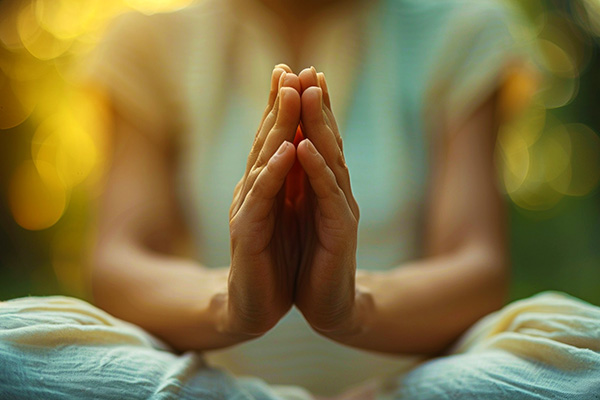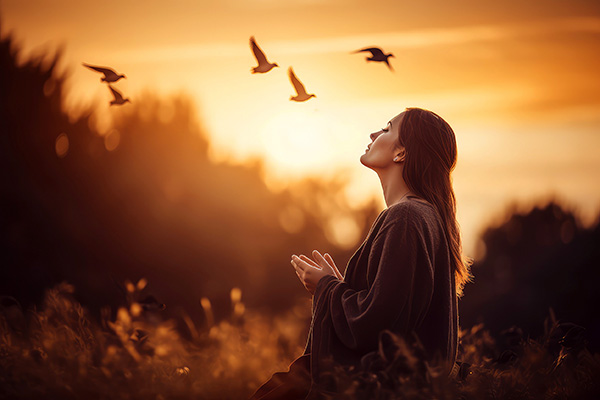emotional freedom
Letting Go Of What No Longer Serves You
 Letting go is never simple or easy, but it’s often necessary for our health, happiness, and spiritual growth. It’s a powerful act that frees our soul and honors our true essence.
Letting go is never simple or easy, but it’s often necessary for our health, happiness, and spiritual growth. It’s a powerful act that frees our soul and honors our true essence.
Letting go is about releasing what no longer serves us to create space for more joy, peace, abundance, and meaningful experiences to flow our way. It’s not about loss or sacrifice – it’s about making room for something better.
By letting go, we deepen our connection to our Higher Self, Spirit, and the Divine. We release the burdens that limit us, allowing us to step into our best life.
It’s a conscious choice to stay stuck or move forward. This means choosing to let go of negative thoughts, emotions, desires, habits, beliefs, or material things that hold us back. When we release these attachments, we open the door to new blessings, miracles, and personal growth.
Choosing to let go and taking the first steps can sometimes feel daunting. It’s normal to feel overwhelmed, but trust that each step you take to release the old and welcome the new brings you closer to peace, joy and lasting fulfillment.
As we release old patterns, we often feel lighter, more energized, and at peace. This newfound freedom allows us to explore new possibilities, pursue our passions, and live authentically. It’s not about forgetting – it’s about freeing ourselves from what holds us back and stepping into the full light of our true potential.
Releasing Resistance Transforms Your Life
 Many years ago I traveled to Sedona, Arizona to attend a teacher training program for The Sedona Method. Little did I know that I was about to discover one of the most important keys to a happy and fulfilling life.
Many years ago I traveled to Sedona, Arizona to attend a teacher training program for The Sedona Method. Little did I know that I was about to discover one of the most important keys to a happy and fulfilling life.
I soon found myself in a conference room filled with psychiatrists, psychologists, and doctors from all over the world. I was a young mother and an novice psychic reader. I didn’t feel on the same professional level as the doctors and behavioral health professionals in the room. I felt intimidated, uncomfortable, and wanted nothing more than to go home.
But within the first few days of training, my worst nightmare came true. The trainer asked me to come to the front of the room and stand facing everyone.
“Oh no,” I thought to myself. “Why in the world did I even come to this class?”
He asked me to demonstrate one of the resistance release techniques he had taught us to a psychiatrist sitting in the front row. My knees were shaking and my heart was racing. But there was no escape, so I decided to just do it. It was a terrifying experience at the time, but it was also one of the best things that ever happened to me!
The Sedona Method is a technique designed to help you release the resistance created by painful or unwanted emotions, allowing you to experience greater personal freedom and well-being. The method involves a series of questions that help you become aware of your feelings and gently encourage you to release them. Resistance is often the cause of suffering in relationships, financial health, career, and all other areas of life.
Forgiving Yourself Is A Spiritual Necessity
 Self-forgiveness is more than just a mental health recommendation – it is a spiritual necessity. It is vital for the spiritually aware person to release guilt, self-blame, and self-criticism, because forgiving oneself is crucial to both personal well-being and spiritual progress. It allows for healing, growth, and the ability to live a more fulfilling and harmonious life.
Self-forgiveness is more than just a mental health recommendation – it is a spiritual necessity. It is vital for the spiritually aware person to release guilt, self-blame, and self-criticism, because forgiving oneself is crucial to both personal well-being and spiritual progress. It allows for healing, growth, and the ability to live a more fulfilling and harmonious life.
Failure to forgive ourselves can have profound personal and spiritual side effects. Carrying guilt and self-blame leads to chronic emotional distress and contributes to anxiety, depression, and low self-esteem. Over time, this can manifest itself in physical symptoms such as headaches, fatigue, or even chronic illness.
A lack of self-forgiveness undermines self-worth and hinders personal growth and development. Difficulty forgiving yourself also strains your relationships with others, as it can lead to withdrawal, defensiveness, or projecting negativity onto those around you. Without forgiveness, our negative feelings toward ourselves can fester and damage even our most cherished relationships with our loved ones and friends.
Holding onto guilt and self-blame blocks the flow of positive energy through the chakras and hinders spiritual well-being. For example, guilt often stagnates in the solar plexus chakra, affecting one’s sense of personal power. Self-forgiveness is essential for clearing such blockages in the energy field.
Forgiveness is also essential to achieving inner peace and harmony. Without it, one can experience constant inner turmoil and restlessness. When we hold onto guilt, shame, or self-blame, parts of our spiritual essence or inner divinity are suppressed or disconnected. It causes separation from one’s spiritual path or a sense of disconnection from spirit and the divine.
Seeing The Spiritual Essence In Others
 My world was turned upside down when my father was diagnosed with pancreatic cancer. For seven agonizing months in 2005, I became his caregiver, managing the extreme emotional and physical toll of his illness.
My world was turned upside down when my father was diagnosed with pancreatic cancer. For seven agonizing months in 2005, I became his caregiver, managing the extreme emotional and physical toll of his illness.
Even the hospice staff, experienced in end-of-life care, commented at the time that my father was not an easy patient to care for. Their observation confirmed my own feelings on the matter and highlighted the unique challenges of the difficult karmic relationship I had with my father.
Throughout this stressful time, I held out hope for a miracle. I felt compelled to seek guidance, but unfortunately Spirit revealed a timeline of six to twelve months. This devastated me at the time, but I’ve since come to accept that arrivals and departures are part of every soul’s journey. Spirit was simply confirming a poignant truth: at some point we are all called home to the spirit realm.
Despite his resistance to any form of treatment, my father allowed a trusted colleague of mine, a master in his healing modality, to visit our home weekly for body alignment sessions. These sessions became a turning point — not only for my father, but for me as well.
During their second session, my healer friend shared an observation that struck a deep chord. He sensed an immense amount of bitterness and resentment in my father, energies he had perceived without any prior knowledge of my father’s emotional state or life history. He then offered me a piece of wisdom that changed the way I viewed not only my father, but all of my relationships: “Try to see only the true spiritual essence that is your father.”
Forgiveness Is Choosing To Take Back Your Power
 Ah, forgiveness! Such a misunderstood concept. For many people, forgiveness, as noble as it may sound, is very difficult, even impossible.
Ah, forgiveness! Such a misunderstood concept. For many people, forgiveness, as noble as it may sound, is very difficult, even impossible.
Sometimes certain wrongs are so grave to us that the offender doesn’t deserve forgiveness in our eyes. There is also a misconception that forgiving someone is tantamount to excusing or justifying their terrible actions. But forgiveness is not about absolving someone of responsibility. Instead, it is a powerful, personal act of release and healing.
When we forgive someone, whether they’ve hurt us emotionally, betrayed our trust, or even caused us physical harm, we’re not letting them off the hook.
We are not condoning their actions or giving them permission to repeat those offenses. Rather, we are choosing to free ourselves from the weight of resentment, pain, and bitterness that binds us to them and their past actions.
Forgiveness is a gift we give ourselves. It allows us to move forward without the burden of past grievances and with an open heart, free of resentment.
By forgiving, we determine for ourselves that the transgressor’s actions and the memory of their misdeeds will no longer hold us hostage or march with us into the future.
While we may not be responsible for what happened to us in the past, we are responsible for how we choose to carry the memory of it into the future. This is the power of forgiveness: it gives us the strength to embrace our present reality with clarity, compassion, and freedom. It also transforms our future, for it is ultimately a karmic choice that will shape our destiny in ways we will only understand much later in this life and beyond.
The Spiritual Power Of Choosing To Forgive
 Forgiveness is a much-discussed topic in spiritual circles. It is also often deeply misunderstood.
Forgiveness is a much-discussed topic in spiritual circles. It is also often deeply misunderstood.
Forgiveness does not mean condoning wrongdoing or accepting abuse or cruelty. Instead, it involves choosing not to carry the darkness and negativity that has been inflicted upon you, and refusing to allow it to affect your well-being, either physically or emotionally.
While it’s ideal to find compassion for those who have wronged you, it’s not always possible. Understand that those who caused you harm are often suffering themselves.
Happy and fulfilled people are naturally kind, generous, and honest. In contrast, those consumed by self-loathing and misery tend to spread chaos and cruelty. Their relationships are full of conflict and dissatisfaction.
I once worked with a man who was clearly struggling with mental illness. Circumstances placed us in a business relationship that I initially tried to avoid, preferring to distance myself from unhealthy situations. However, I was compelled to help him because I was told that my true role was to support his children and providing help where it was needed most.
This unfortunate man is consumed by rage from his own traumatic past-abuse by his mother, mistreatment by her successive husbands, and conflict with his first ex-wife. His life is a testament to the destructive power of unresolved anger and lack of forgiveness. His toxic energy is rooted in past hurts and a cycle of inflicting pain on others.
